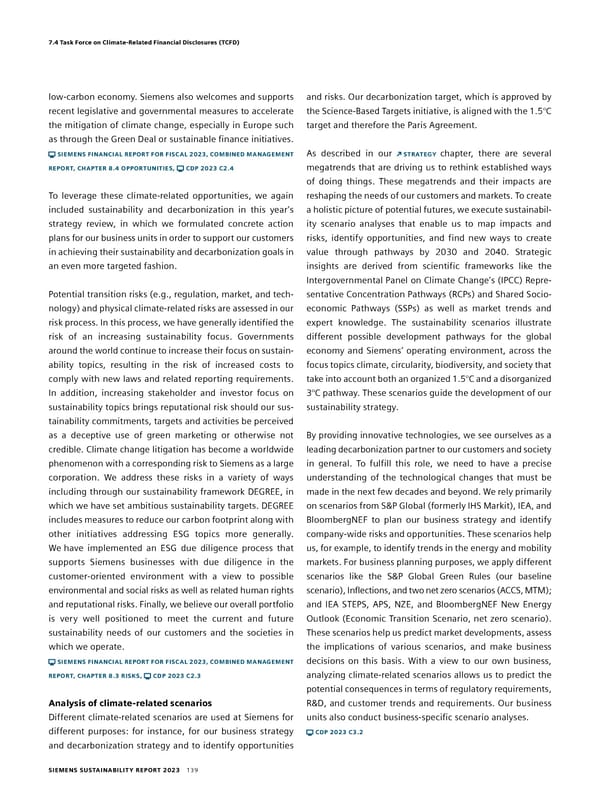7.4 Task Force on ClimateRelated Financial Disclosures (TCFD) low-carbon economy. Siemens also welcomes and supports and risks. Our decarbonization target, which is approved by recent legislative and governmental measures to accelerate the Science-Based Targets initiative, is aligned with the 1.5°C the mitigation of climate change, especially in Europe such target and therefore the Paris Agreement. as through the Green Deal or sustainable finance initiatives. SIEMENS FINANCIAL REPORT FOR FISCAL 2023, COMBINED MANAGEMENT As described in our STRATEGY chapter, there are several REPORT, CHAPTER 8.4 OPPORTUNITIES, CDP 2023 C2.4 megatrends that are driving us to rethink established ways of doing things. These megatrends and their impacts are To leverage these climate-related opportunities, we again reshaping the needs of our customers and markets. To create included sustainability and decarbonization in this year’s a holistic picture of potential futures, we execute sustainabil- strategy review, in which we formulated concrete action ity scenario analyses that enable us to map impacts and plans for our business units in order to support our customers risks, identify opportunities, and find new ways to create in achieving their sustainability and decarbonization goals in value through pathways by 2030 and 2040. Strategic an even more targeted fashion. insights are derived from scientific frameworks like the Intergovernmental Panel on Climate Change’s (IPCC) Repre- Potential transition risks (e.g., regulation, market, and tech- sentative Concentration Pathways (RCPs) and Shared Socio- nology) and physical climate-related risks are assessed in our economic Pathways (SSPs) as well as market trends and risk process. In this process, we have generally identified the expert knowledge. The sustainability scenarios illustrate risk of an increasing sustainability focus. Governments different possible development pathways for the global around the world continue to increase their focus on sustain- economy and Siemens’ operating environment, across the ability topics, resulting in the risk of increased costs to focus topics climate, circularity, biodiversity, and society that comply with new laws and related reporting requirements. take into account both an organized 1.5°C and a disorganized In addition, increasing stakeholder and investor focus on 3°C pathway. These scenarios guide the development of our sustainability topics brings reputational risk should our sus- sustainability strategy. tainability commitments, targets and activities be perceived as a deceptive use of green marketing or otherwise not By providing innovative technologies, we see ourselves as a credible. Climate change litigation has become a worldwide leading decarbonization partner to our customers and society phenomenon with a corresponding risk to Siemens as a large in general. To fulfill this role, we need to have a precise corporation. We address these risks in a variety of ways understanding of the technological changes that must be including through our sustainability framework DEGREE, in made in the next few decades and beyond. We rely primarily which we have set ambitious sustainability targets. DEGREE on scenarios from S&P Global (formerly IHS Markit), IEA, and includes measures to reduce our carbon footprint along with BloombergNEF to plan our business strategy and identify other initiatives addressing ESG topics more generally. company-wide risks and opportunities. These scenarios help We have implemented an ESG due diligence process that us, for example, to identify trends in the energy and mobility supports Siemens businesses with due diligence in the markets. For business planning purposes, we apply different customer- oriented environment with a view to possible scenarios like the S&P Global Green Rules (our baseline environmental and social risks as well as related human rights scenario), Inflections, and two net zero scenarios (ACCS, MTM); and reputational risks. Finally, we believe our overall portfolio and IEA STEPS, APS, NZE, and BloombergNEF New Energy is very well positioned to meet the current and future Outlook (Economic Transition Scenario, net zero scenario). sustainability needs of our customers and the societies in These scenarios help us predict market developments, assess which we operate. the implications of various scenarios, and make business SIEMENS FINANCIAL REPORT FOR FISCAL 2023, COMBINED MANAGEMENT decisions on this basis. With a view to our own business, REPORT, CHAPTER 8.3 RISKS, CDP 2023 C2.3 analyzing climate-related scenarios allows us to predict the potential consequences in terms of regulatory requirements, Analysis of climaterelated scenarios R&D, and customer trends and requirements. Our business Different climate-related scenarios are used at Siemens for units also conduct business-specific scenario analyses. different purposes: for instance, for our business strategy CDP 2023 C3.2 and decarbonization strategy and to identify opportunities SIEMENS SUSTAINABILITY REPORT 2023 139
 Sustainability Report Page 138 Page 140
Sustainability Report Page 138 Page 140